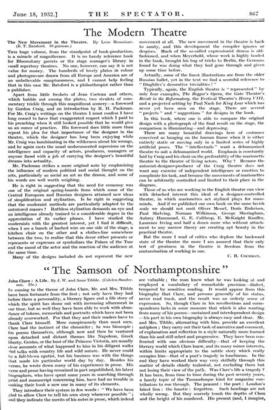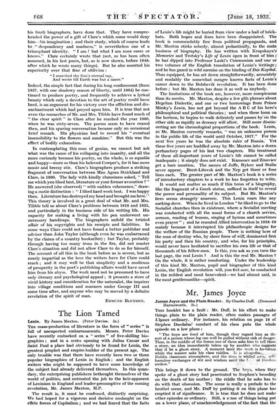" The Samson of Northamptonshire "
IN coming to the theme of John Clare, Mr. and Mrs. Tibble have been fortunate from the first ; not only have they had before them a personality, a literary figure and a life story of which the spirit has shone out with increasing allurement in our time, but as well they have been able to work with abun- dance of tokens, memorials and portraits which have not been already overworked. For that they and their readers have to thank Clare himself. More conspicuously than most men, Clare had the instinct of the chronicler ; he was bioseopic ; his poems themselves, although now and then he ventured upon detached and distant themes like Napoleon, Greek liberty, Genius, or the bust of the Princess Victoria, are usually close accounts of what happened to him in his diligent walks 'fad talks with country life and wild nature. He never could be a full-blown egotist, but his business was with the things that made his particular world day by day. Besides his verses, he wrote down many of his experiences in prose. His verse and prose having remained in part unpublished, his latest biographers, who have spent some years in searching through print and manuscript concerning him, have had no trouble in making their book a new one in many of its elements.
They introduce their system in few words : " We have been glad to allow Clare to tell his own story wherever possible " ; and they indicate the merits of his notes in prose, which indeed are valuable ; the man knew what he was looking at and employed a vocabulary of remarkable precision—dialect, tempered by sensitive reading. It would appear from this biography that Clare, and persons generally of his status, never read trash, and the result was an orderly sense of expression. So, though Clare in his recollections and corre- spondence lacks in some measure that which is also wanting from many of his poems--sustained and interdependent design ---his part in his own biography is always easy and clear. Mr. and Mrs. Tibble, alternating with him, provide an excellent antiphon ; they carry out their task of narrative and comment, of explanation and reflection in a style naturally more learned than his and still select and progressive. They have been con- fronted with one obvious difficulty—that of keeping the literary world which Clare knew, and its many minor interests, within limits appropriate to the subtle story which really occupies him—that of a poet's tragedy in lonelinesss. In the end they have worked their way very skilfully through this matter of details chiefly technical, not excluding them but not losing their view of the path. Was Clare's life a tragedy ? It has been, from time to time during the past seventy years, a handy topic of the Tussaudesque kind for magazine con- tributors to run through. The peasant : the poet : London's latest lion : the lunatic : forgotten. Such headings are not wholly wrong. But they scarcely touch the depths of Clare and the height of his manhood. His present (and, I imagine,
his final) biographers, have done that. They have compre- hended the power of a gift of Clare's which some would deny him—his imagination ; and their study, which of course leads to ." despondency and madness," is nevertheless one of a triumphant identity. " I am ! but what I am none cares or knows." Clare certainly wrote that (not, as has been often assumed, in his last poem, but, as is now shown, before 1848, after which he wrote many things). But he also asserted his superiority over that fear of oblivion :
"I snatched the Sun's eternal ray,
And wrote till Earth was but a name."
Indeed, the simple fact that during his long confinement (from. 1837, with one shadowy season of liberty, until 1864) he con- tinued to produce poetry, and frequently to achieve a lyrical beauty which only a devotion to the art of poetry could have.. bred, is an argument for his victory over the affliction and dis- enchantment which had preyed upon him. It is true that not even the researches of Mr. and Mrs. Tibble have found much of "...the clear spirit " in Clare after he reached the year 1860, when he was sixty-seven. The poems seem to have ceased then, and his sparing conversation became only an occasional brief remark. His physician had to record his " eventual insensibility to the flowers and sunshine." But this was the effect of bodily exhaustion.
In contemplating this man of genius, we cannot but ask what was the cause of his collapsing into insanity, and all the more curiously because his poetry, on the whole, is so equable and happy—more so than his beloved Cowper's, for it has more music and breezy stir. Clare's biographers produce a striking fragment of conversation between Miss Agnes Strickland and Clare, in 1860. The lady with kindly clumsiness asked, " Tell me which you liked best, literature or your former avocation ? " He answered (she observed) " with sudden vehemence," draw- ing a rustic distinction : -" I liked hard work best. I was happy then. Literature has destroyed my head and brought me here." This theory is involved in a great deal of what Mr. and. Mrs. Tibble tell us about Clare's problems between 1818 and 1835, and particularly in the business side of his writing life. His capacity for making a living with his pen underwent un- necessary handicaps. The biographers unfold the twisted affair of his copyrights and his receipts and liabilities. In some ways Clare could not have found a better publisher and adviser than John Taylor (although even he was embarrassed by the claims of a country bookseller) but Taylor, probably through having too many irons in the fire, did not master Clare's situation and did not allow Clare to do so for himself. The account of all this in the book before us is severe, but as nearly impartial as the love the writers have for Clare could reach ; and it may well be that simplicity and a modicum of prosperity in the poet's publishing affairs would have saved him from his abyss. The work need not be presumed to have only literary and psychological appeal ; it presents a store of vivid history and consideration for the naturalist, the inquirer into village conditions and manners under George III and some time after, and anyone who may be moved by a definite revelation of the spirit of man.
EDMUND BLUNT/EN.









































 Previous page
Previous page